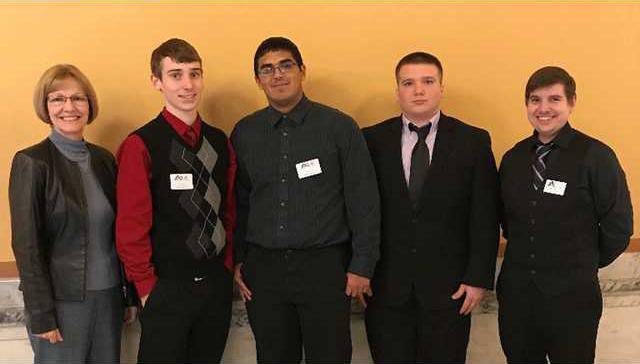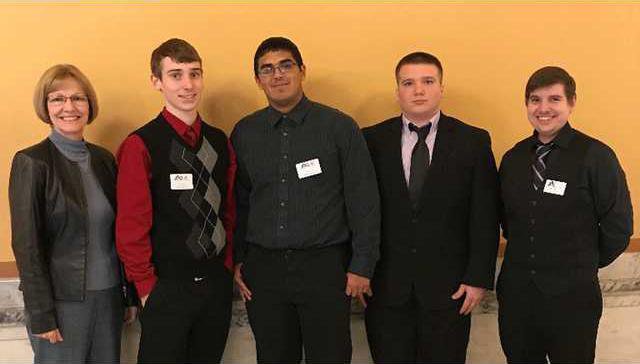This week is the “Turnaround” deadline when bills must be “turned around” from the chamber where they started to the other chamber. Bills not heard in and passed out of a committee and passed the full Senate by now are considered dead for the session. The content of those bills never really dies as the language can be amended into another bill, but the bill number is dead for the remainder of the session.
• For every rule, there is an exception. If a bill is heard in, or at any point sent to the Senate Assessment & Taxation, Ways & Means, the House Taxation, Appropriations, or either chamber’s Federal & State Affairs Committees, it is exempt from these legislative deadlines and can be considered at any time.
• The Blessing of the Bills: One of the last actions taken before the turnaround deadline is for House and Senate leadership to move bills from one committee into an exempt committee, and then back where it was. This “blesses” the bill because it has touched an exempt committee.
The Senate debated 34 bills this week alone, and we have a few days off as legislative staff completes the paperwork and updates the website with all the bill activity. Next week, we begin hearing bills in committees that passed the House this week, and they begin hearing the bills we passed.
A bill we passed last year in response to the tragic death of a legislative colleague’s son has had some unintended consequences for rural communities. The bill intended to make amusement rides safer and increase inspections, but it became nearly impossible for rural communities to host carnival rides. A local fair which rents carnival rides is different than a commercial amusement part, but they are regulated the same, and that was not the intent of last year’s bill. I have worked closely with Sen. Billinger to address the needs of rural communities with SB 307, which defines home-owned amusement and agritourism rides, and sets up separate inspections rules. The bill passed the Senate unanimously.
On the Floor
Private prisons: SB 328 would require prior legislative authorization for any state agency to enter into an agreement or take any action to outsource or privatize security operations of correctional or juvenile correctional facilities operated by a state agency. The bill passed the Senate unanimously.
SB 312 would add the license of dental therapists – an interim step between a hygienist and a dentist, specifically developed for rural areas with a shortage of dentists. Dental therapists would be required to be a licensed dental hygienist, graduate from a dental therapist education program approved by the Board of Regents, acquire clinical training hours, pass a clinical examination and obtain professional liability insurance. The bill passed the Senate 38-0.
SB 194—The Senate approved a bill, 34-5, introduced last year that would increase the amount a groundwater management district could assess water use charges against everyone who withdraws groundwater from within the district. Currently, the maximum charge is $1 for each acre-foot of groundwater withdrawn, unless the authorized place of use for the groundwater withdrawn within the district is more than 50 percent outside the district. In that case, the maximum charge is $1.50 per acre-foot. This bill would increase those amounts to $1.50 and $2, respectively. View testimony from the previous hearing here.
The ”Little Jerusalem Bill” (adding the Flint Hills Trail State Park in Miami, Franklin, Osage, Lyon, Morris and Dickinson counties and the Little Jerusalem Badlands State Park in Logan County to the state park system) I discussed in my last newsletter (SB 331) passed the Senate 26-14, I voted yes.
HB 2106—The Senate unanimously approved legislation that would remove red tape and duplicative licensing requirements for alcohol and drug addiction treatment organizations that have received accreditation from the Commission on Accreditation of Rehabilitation Services, the Joint Commission, the Council on Accreditation or another national accrediting body approved by the Department, by passing separate state accreditation. In addition, the bill would require the Department of Aging and Disability Services (KDADS) to inspect accredited treatment facilities to determine compliance with state licensing standards. The House approved this legislation last year with a 125-0 vote.
The brunch bill flew through the House and Senate in just five weeks! HB 2482 would expand the hours that people could drink alcohol in bars, clubs and other establishments from 6 a.m. to 2 a.m. the following calendar day. Current law allows drinking from 9 a.m. to 2 a.m. the following calendar day. Farm wineries, microbreweries and microdistilleries would be allowed to sell alcoholic products in their original containers between 6 a.m. and 12 a.m. on any day. Current law limits the sale of alcohol on Sundays at farm wineries from noon to 6 p.m., and at microbreweries and microdistilleries from 11 a.m. to 7 p.m. The House approved an earlier version 75-47, and it passed the Senate 35-5, I voted yes.
A number of bills dealing with industrial hemp have moved through the legislature in recent years. SB 263 would allow the Department of Agriculture, either alone or in coordination with a state higher education institution, to grow and cultivate industrial hemp, as well as promote the research and development of industrial hemp. The bill would allow individuals to participate in the research program under the oversight of the Department. View hearing testimony here. It passed the Senate 36-3, I voted yes.
SB 265 would amend the crime of incest to specify the phrase “otherwise lawful sexual intercourse or sodomy” does not include the crimes of rape or aggravated criminal sodomy as defined in the Kansas Criminal Code. SB 265 would clarify that unlawful sexual acts will be prosecuted and punished as rape or aggravated sodomy, rather than receiving a lesser sentence under the incest statute. It passed the Senate 39-0.
SB 336 would provide compensation, tuition assistance, and state health care benefit programs to individuals who were wrongfully convicted and imprisoned. Under this bill, those individuals would receive $50,000 for each year they were wrongfully imprisoned. It passed the Senate unanimously.
Committee Work
Education
The committee held hearings on a number of bills, none of which were brought up for debate and passage to the full Senate:
• SB 352 would require transportation funding for school districts to be taken from the State General Fund, not the State Highway Fund. The bill also would abolish the general state aid transportation weighting. While a controversial topic, this would allow the money the state spends for school transportation to be “counted” toward its investment in schools. I think this issue will be included in our final school funding proposal.
• SB 319 would allow children in foster care to attend school in the district where the foster care contractor provides services.
• The committee reviewed SB 357 which would require the Department of Education to conduct a study of the cost of career technical education in Kansas and report its findings by Jan. 15, 2019. The study would outline the various career technical education programs; the costs of the programs including salaries and wages, materials, equipment, and facilities; and the coordination between school districts, community colleges and technical colleges.
Public Health & Welfare
The committee held hearings on step therapy for chronic disease and two bills which would allow pharmacists to administer certain drugs, but none of these were “worked” in committee.
• Jargon Alert: After a hearing has been held on a bill, it is eligible to be “worked” or brought up for discussion among the committee. Committee members can offer changes (amendments) to the bill or make a motion for passage to the full Senate for consideration or to table the bill for later conversation. At this point in the session, tabling a bill kills it due to legislative deadlines. Bills which are not “worked” as of Monday, Feb. 19 cannot be considered for the remainder of the session.
We heard, worked, and passed the following bills:
• Current law only allows individuals to be eligible for a discounted senior cosmetology license if they have practiced for at least 40 years and are at least 70 years old. SB 398 would reduce that age to at least 60 years old with 10 years of licensure. It passed the Senate 39-0.
• Under current law, individuals may be licensed as professional counselors or clinical professional counselors through the Behavioral Sciences Regulatory Board after meeting certain requirements that include obtaining a graduate degree in counseling from a college or university approved by the board. SB 386 would change the requirement so licensees may obtain a graduate degree in counseling or a related field. It passed the Senate unanimously.
• Medicaid Expansion, Part II: SB 38 would expand Medicaid services under certain (circumstances) to adult applicants under 65 years old, who are not pregnant and whose income does not exceed 133 percent of the federal poverty level. The bill would take effect on Jan. 1, 2019. The Department of Health and Environment estimates that 150,000 individuals would become eligible for Medicaid coverage. A detailed listing of the bill’s provisions is contained in the bill’s fiscal note. The bill was not brought for consideration in the full Senate, but the hearing drew a standing room only crowd of about 300!
• SB 311 would add certified emergency medical services attendants to the list of individuals required to report suspected abuse, neglect or exploitation of residents in adult care homes and other related facilities. The bill passed the Senate unanimously.
Agriculture & Natural Resources
Technology in poultry science is improving and it could become a more viable option for Kansas farmers. The committee heard and passed a number of bills on poultry operations:
SB 405 would establish an animal unit conversion factor of .003 for both broilers and laying hens for poultry facilities using dry manure systems.
o Animal units are used in the permitting, registration and the environmental review process because they allow equal standards for all animals based on size and manure production.
o An animal unit is calculated by multiplying the number of animals by an animal unit factor for the specific type of animal.
The bill would require chicken facilities to have a federal permit if 125,000 or more broilers or 82,000 laying hens are confined. Due to the controversy over the Tyson plant proposed and rejected in Tonganoxie, a number of amendments were offered, and the bill eventually passed on a 29-10 vote. I voted yes.
It is an honor and privilege to serve you in Topeka. Please do not hesitate to contact me with questions about these or other legislative issues important to you.





